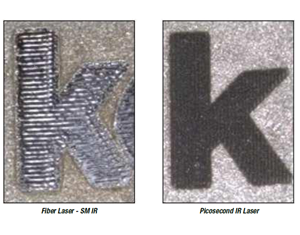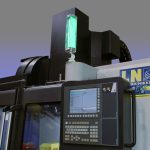Picosecond Black, Corrosion-Resistant Marking
Picosecond Black, Corrosion-Resistant Marking
This black mark is generated using a picosecond laser. The ultrashort pulse durations of the picosecond laser allows it to impart energy to a material surface with almost no thermal effect. Unlike the heat-generated annealed marks made with fiber lasers, marks created by picosecond IR lasers are extremely high contrast periodic nanostructures with antireflective properties that make the marks appear deep black against their surroundings; they are restructured surface material rather than an oxide layer, making them highly resistant to bacterial growth, passivation, corrosion and autoclaving.

AMADA WELD TECH, INC. now offers black, corrosion-resistant marking capability for the medical device manufacturing industry. This unique mark, frequently used for stainless steel implantable device and surgical tools (e.g. banding around trocars or UDI marking on surgical scalpels) survives multiple passivation and autoclaving cycles.
This black mark is generated using a picosecond laser. The ultrashort pulse durations of the picosecond laser allows it to impart energy to a material surface with almost no thermal effect. Unlike the heat-generated annealed marks made with fiber lasers, marks created by picosecond IR lasers are extremely high contrast periodic nanostructures with antireflective properties that make the marks appear deep black against their surroundings; they are restructured surface material rather than an oxide layer, making them highly resistant to bacterial growth, passivation, corrosion and autoclaving. In addition, the processing window for developing the marks on stainless steels, aluminum and titanium is significantly wider than that of traditional fiber lasers. Picosecond lasers also offer excellent marking capabilities on polymers often used in medical devices.
The picosecond laser is integrated into bespoke CDRH Class 1 systems that are designed for a specific part or range of parts. System features may include a galvo scanning head, a bar code scanner for job load, 4 or more axes of motion and machine vision for part recognition and mark placement.





